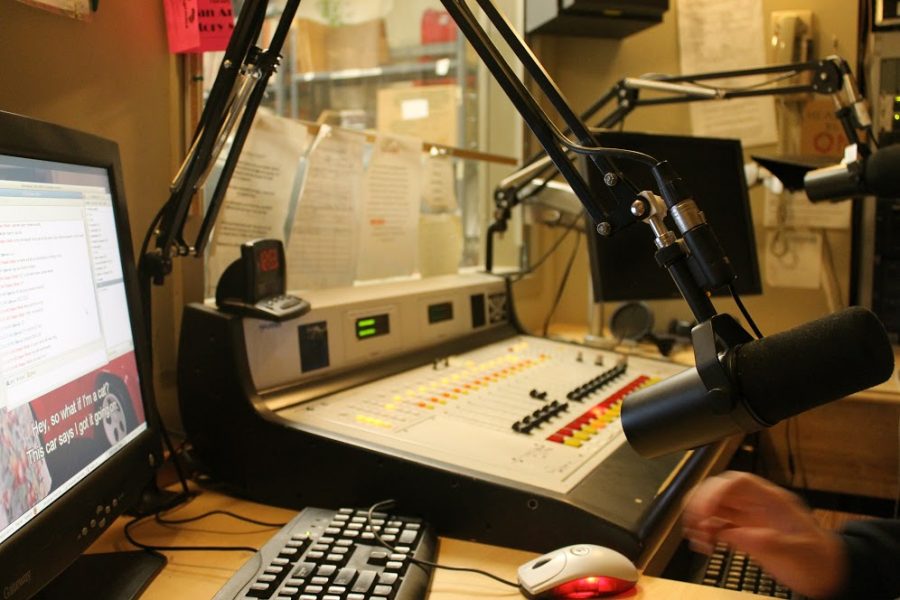WRUV broadcasts pre-recorded shows in wake of COVID-19
April 14, 2020
A few months ago, live music rang out from the open doors of WRUV’s station.
Day and night, student and community member DJs could be seen laughing into their microphones and switching dials on the control board.
Now, no one has stepped into the tiny radio station for weeks.
WRUV has listeners from across the country who turn to the station for groovy music, funny commentary and a source of entertainment from DJs, especially during troubling times.
In response to the COVID-19 crisis, the station has decided to broadcast pre-recorded shows curated by the WRUV’s DJs as well as old podcasts and interviews.
Junior Katie Masterson, station manager for WRUV, said it was important for her to keep the station going even though no one could physically enter the studio.
“We wanted to do our best to keep people involved,” Masterson said. “For a lot of people it’s a therapeutic part of their week. At a time when we don’t have much stability in our lives it’s important to keep some semblance of it.”
Masterson credits the WRUV executive board for acting quickly and making arrangements so the station could continue to put out content.
“We want to make sure that the Burlington community feels like we are here for them,” she said. “Music is a healer, we want to be a place where people find some calm, solace, excitement or hope.”
Jeffrey Pascoe, the station’s automation programmer, has been with the station since 2007. The automation system is a computerized database that plays over airways 24/7 when live shows are not being broadcasted.
No dead air can be played on air, according to Federal Communications Commission (FCC) guidelines.
“We only figured out this [automation] option a couple of weeks ago,” Pascoe said. “Some people don’t have microphones or access to new music we have in the station. It’s building. Nobody ever tried this before.”
Broadcasted shows are typically two hours long, and consist of roughly 20 songs, some talking and Public Service Announcements.
Pascoe said the process is fairly easy. The DJ sends Pascoe an MP3 file of their show through Dropbox, he downloads the show to the automation computer and schedules it. He uses a program called Rudaga.
Because this transition to pre-recorded shows is unprecedented, only two DJs currently are producing new shows, DJ Llu and sophomore Ben Roth.
Roth’s show is called “Everyday Sunshine with the Purple Shaman” and is broadcasted every Sunday from 4-6 p.m. Roth has been a DJ since fall 2018, and is WRUV’s local music director.
Roth said a DJ needs a microphone and a sound editing program, such as Audacity, to record a show.
“Some people spin vinyl, play off streaming services, do mixing programs, so it’s complicated,” Roth said. “Depending on how you normally do your show, there will be different implications as to whether it translates to an easy to record at home program.”
Roth said he wanted to stay involved with the station and contribute in whatever way possible. He is starting to guide other DJs who wish to pre-record their own shows in order to adapt to quarantine.
“It’s not the most straightforward thing to record your show ahead of time if you don’t have the right equipment and understand the software,” Roth said.
He said hearing his voice broadcasted on the radio has been an interesting experience, because he is used to doing live shows.
“I can make the end product better, but what’s freeing about being live on the air is that if you screw up, it’s done,” Roth said. “This new setup, I can obsess over it more.”
For 14 years, Chris Evans has been the adviser for UVM Student Media, which includes UVMtv, The Vermont Cynic and WRUV. He works closely with the executive board for WRUV.
Evans said more people are planning on continuing their shows in the future, and he is helping guide them towards that through online meetings and video chats.
“It’s been great watching the WRUV students and community DJs work together to create a system allowing us to upload shows remotely and get them into rotation,” Evans said. “It’s actually been kind of fun, figuring out the technical side, too.”
As an educational station, DJs are also recording PSAs about the coronavirus, as people turn to WRUV for information in times of need.
Masterson said one positive is that this circumstance is opening up avenues for people to continue to DJ while they are on study abroad, out sick or taking a semester off.
“Out of this horrific time, for the entire world, there are little glimmers of hope and things we do as a community to get through it,” she said. “Hopefully we can use this to evolve our station.”







